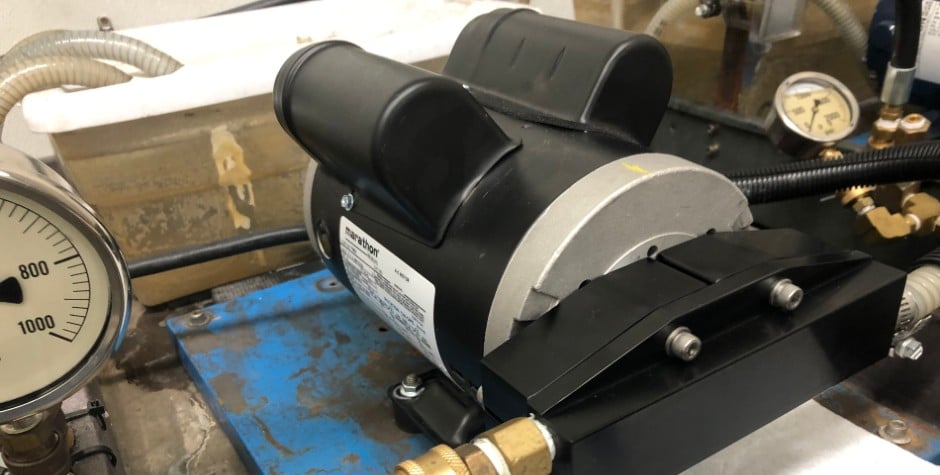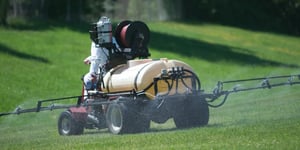AC and DC Pump Motor Troubleshooting Tips

Shawn Glover, VP of Sales, Sep 15, 2020

Safety Note: These tips are intended to help engineers and technicians who are experienced working with electricity and the safety hazards encountered. If you are inexperienced please seek the help of an electrical professional before troubleshooting any electrical component.
There are some common pump problems that engineers or technicians encounter when installing or operating a pump motor. Before you begin troubleshooting your pump motor problem, you need to know what kind of pump motor it is.
Electric-powered pumps are inherently less problematic and require less maintenance than gas-powered pumps. In addition to having lower operating costs, quieter operation, and a smaller footprint, there’s simply less that can go wrong with AC or DC electric pump motors.
Even though electric-powered pumps may have fewer problems and less maintenance than gas, there’s still a chance you might need to overcome one of the following pump issues.
AC Pump Motor Troubleshooting Tips
Pump motors that operate using AC (alternating current) have fewer moving parts, fixed speeds, and are intended for applications with lower startup power demands.
AC Pump Motor Fails to Start After Setup
Potential Causes
- The motor may be miswired
- The motor may be damaged, causing the rotor to strike the stator
- The fan may be striking a bent fan guard
How to Fix It
Prior to exploring other troubleshooting techniques, always check the wiring diagram located on the side of the AC motor to ensure it is wired properly. If any motor components are misaligned, you may be able to reassemble it, taking special note of proper placement. For a bent fan guard, first attempt to straighten it but, if that doesn’t work, the fan guard may need to be replaced.
AC Pump Motor Fails to Start After Running
Potential Cause
- Tripped circuit breaker or fuse
- A shorted stator
- Overloaded motor or jammed load
- Failed centrifugal switch or capacitor
How to Fix It
Check for blown fuses and replace if necessary, or reset breakers. If the issue continues, it may have a shorted stator. Disassemble and check the windings and internal connections. If you see burn marks, the stator is likely blown and needs replacing. If overloaded, confirm that the amp draw is within specified ratings found on the motor nameplate.
To examine whether the centrifugal switch failed, disassemble the motor and check the contacts and connections. Ensure that the weights move freely and that the switch isn’t loose. If you notice burn marks or pitting, replace the switch.
AC Pump Motor Trips the Overload Protector Repeatedly
Potential Causes
- Too much load on the motor
- Air temperatures are too high
- Defective thermal overload
- Shorted or grounded stator windings
How to Fix It
For starters, check if the load is jammed. For replacement motors, confirm that the voltage rating is the same as your previous motor, and inspect how many amps are being drawn when the motor is unloaded to confirm it’s less than the specified maximum capacity rating. Is the pump being operated in extreme heat? If so, it may simply need more airflow or ventilation to ensure proper cooling. Any defective parts, such as a thermal overload, should be replaced with one that is compatible. As for stators that experience shorts or grounds, check for loose or damaged wires and other defects.
DC Pump Motor Troubleshooting Tips
Pump motors that operate using DC (direct current) power are generally smaller, have adjustable motor speeds, and are intended for systems that require higher startup power and torque.
DC Pump Motor Fails to Start After Setup
Potential Causes
- The motor may be miswired
- The battery doesn’t have any output power
- The motor may be damaged, causing the armature to rub against the magnets
- The fan may be striking a bent fan guard
How to Fix It
As with AC motors, make sure the motor is wired properly and the wiring connections are in good condition. If you suspect there’s no power coming from the battery, measure the voltage output. If the armature rubs against the magnets, the motor may need to be replaced. For bent fan guards, attempt to straighten them and replace as needed.
DC Pump Motor Fails to Start After Running
Potential Cause
- Tripped circuit breaker or fuse
- A shorted armature
- Failed or defective controller
- Worn brushes
How to Fix It
If the pump has proper volts at the motor but doesn’t run, the motor may be bad or it may need brushes. If it doesn’t have proper volts, check the current flow from the battery and whether a circuit breaker is tripped or a fuse is blown and needs replacing. Also check to make sure there’s a good connection for the ground wire and ground stud. To check for a shorted armature, disassemble the motor and check for burnt coils on the armature or burnt bars on the commutator. Finding either of these issues will require replacing the motor.
Over time, brushes may become worn and no longer make proper contact with the commutator. A simple inspection of the brushes can indicate whether contact is being made.
DC Pump Motor Runs the Wrong Way
Potential Cause
- Switched wiring
How to Fix It
The solution to a motor that runs in the wrong direction is pretty straightforward: incorrect wiring. Simply switch the two main motor lead wires and the problem should be resolved — RED is always positive (+) and BLACK is always negative (-).
How to Address Persistent Pump Motor Issues
Sometimes repeated pump motor problems and failures can indicate a deeper issue that can only be addressed with a different kind of pump that’s made out of better materials or with a different assembly that’s customized to fit your system. If you continue to have issues with your pumps, causing costly repairs and downtimes, maybe it’s time to consider speaking with a pump expert to do the troubleshooting for you.
You might be surprised to discover alternative pump motor recommendations that are specifically designed for your industry and application, meaning you’ll have little use for these pump motor troubleshooting tips in the future. To learn more about the pros and cons of different pump types on the market, check out our Pump Comparison Cheat Sheet below.
Reach out to the pump experts and engineers at Pumptec for a complimentary assessment of your current pump usage and most frustrating problems. We’ll help you tackle them with a customized solution.



